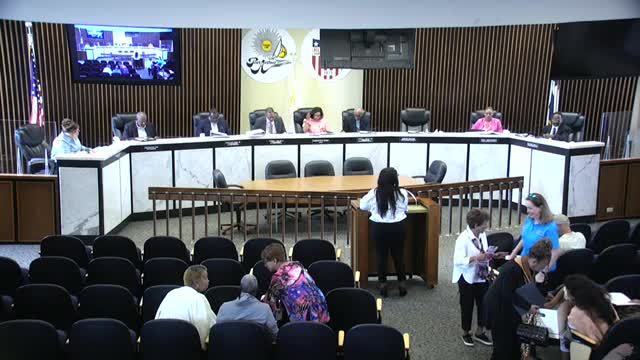Port Arthur council holds public hearing on EDC sales-tax proposition, members urge clear ballot limits
October 07, 2025 | Port Arthur City, Jefferson County, Texas
This article was created by AI summarizing key points discussed. AI makes mistakes, so for full details and context, please refer to the video of the full meeting. Please report any errors so we can fix them. Report an error »

The Port Arthur City Council held a public hearing Oct. 7 on a proposed proposition that would authorize the Port Arthur Economic Development Corporation to use the sales and use tax under Chapter 504 of the Texas Local Government Code for a broader set of project categories, including recreational or community facilities, affordable housing, water supply projects, business attraction and sports venues.
The hearing drew comments from council members who urged clear ballot language defining limits on how the tax revenue could be used. Councilmember Doucette told residents to “read local government code chapter 504, sections 256, 257, 260, and 352,” and said the relevant statutes “will tell you exactly what type of language you should have in a proposition” and to look for the keyword “limits.”
Councilmember Frank, a longtime proponent, said the measure would create a new tool the city lacks and argued it would let Port Arthur pursue entertainment and quality-of-life investments such as indoor family entertainment venues, skating rinks and incubators for small businesses. Frank said the hybrid approach — combining Type A and Type B EDC authority — would let the city act quickly when opportunities arise rather than waiting for the timing of elections.
Other council members said the EDC board’s makeup will not change under the proposal and that any projects using Type B funds still require voter approval; council members said public hearings and additional outreach would follow should the proposition pass. Councilmember Lewis requested that, before implementation of any program under a hybrid framework, staff hold “at least 2 to 3 public hearings to explain to the public exactly what we’re gonna be doing with the monies.”
Mayor Charlotte M. Moses closed the public hearing after council discussion. No ordinance or final vote to place the proposition on a ballot occurred at the Oct. 7 meeting; the hearing record will inform whether and how the measure is placed before voters.
Why it matters: The change would expand the Economic Development Corporation’s allowable projects under state law and could enable Port Arthur to invest sales-tax proceeds in projects aimed at retaining local consumer spending and drawing visitors. Council members repeatedly urged precise ballot language and limits so voters understand how funds would be used.
The hearing drew comments from council members who urged clear ballot language defining limits on how the tax revenue could be used. Councilmember Doucette told residents to “read local government code chapter 504, sections 256, 257, 260, and 352,” and said the relevant statutes “will tell you exactly what type of language you should have in a proposition” and to look for the keyword “limits.”
Councilmember Frank, a longtime proponent, said the measure would create a new tool the city lacks and argued it would let Port Arthur pursue entertainment and quality-of-life investments such as indoor family entertainment venues, skating rinks and incubators for small businesses. Frank said the hybrid approach — combining Type A and Type B EDC authority — would let the city act quickly when opportunities arise rather than waiting for the timing of elections.
Other council members said the EDC board’s makeup will not change under the proposal and that any projects using Type B funds still require voter approval; council members said public hearings and additional outreach would follow should the proposition pass. Councilmember Lewis requested that, before implementation of any program under a hybrid framework, staff hold “at least 2 to 3 public hearings to explain to the public exactly what we’re gonna be doing with the monies.”
Mayor Charlotte M. Moses closed the public hearing after council discussion. No ordinance or final vote to place the proposition on a ballot occurred at the Oct. 7 meeting; the hearing record will inform whether and how the measure is placed before voters.
Why it matters: The change would expand the Economic Development Corporation’s allowable projects under state law and could enable Port Arthur to invest sales-tax proceeds in projects aimed at retaining local consumer spending and drawing visitors. Council members repeatedly urged precise ballot language and limits so voters understand how funds would be used.
View full meeting
This article is based on a recent meeting—watch the full video and explore the complete transcript for deeper insights into the discussion.
View full meeting
